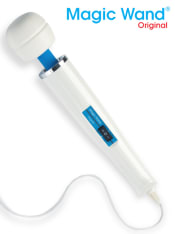What is an Orgasm?

GoodVibes.com > How To Articles > Sex Tips & Anatomy
Shop Magic Wand Vibrator

See All Vibes
Most of us have heard stories of thunder claps, crashing waves, quaking thighs and multiple orgasms, leaving some of us to wonder: what am I missing? The first step to understanding your own pleasure is to not compare yourself to other people or what you think everyone else is doing. An orgasmic experience is as unique as a fingerprint. Orgasms can be barely there, a faint quiver, a show stopper, a spiritual outlet, and more. In addition, some people may not desire to experience an orgasm or may never have one. Each person’s sexual experience is unique and your best bet is to discover your own, rather than try to be like someone else. We highly recommend treating orgasms as a possible, even probable, outcome of any sexual exploration instead of the goal of a sexual experience.
The Emotional and Mental Side of Orgasms: What’s So Sexy about the Brain?
Orgasms are whatever you perceive them to be. How you feel about yourself, your partner, and sex, will affect your sexual experiences.
- Our brain is often called our largest sex organ.
- Our ideas around sex, pleasure and our right to pleasure influence the way we experience pleasure and orgasms.
- During partner sex, having open communication, honesty, and telling a partner what you need and enjoy, can help a sexual experience be pleasurable and orgasmic.
By understanding how and why orgasm occurs, people can better understand their own bodies. And the more you know your body, the more easily you can experience pleasure and orgasm.
The Physiological Side of Orgasms
From a physiological perspective, sexologists Master and Johnson described four general stages of the human sexual response cycle. You can use their model as a flexible guideline or reference for understanding your own body’s cycle. It is extremely important to remember that everyone is different and some people may recognize all, a part, or none of the stages in their own personal cycle.
Many variables will affect your sexual response, including age, physical and emotional state and what kinds of sensations you’re feeling. Your sexual response will change over time, so your past experiences may work better as a place to start rather than something to try to recreate. Besides, that means that you can have the pleasure of rediscovering yourself instead of doing the same things your entire life!
The Sexual Response Cycle
Arousal
For many people, the sexual response cycle begins with arousal. There is a wide range of things that people can find stimulating. Essentially anything that taps into your senses -- a touch, a fantasy, a smell, a taste, or a thought -- can be arousing.
This stimulation triggers an increase in blood flow throughout the body, including but not limited to the genitals.
- Increased blood flow to the penis, vulva, clitoris, vagina, lips, pelvic floor, anus, earlobes and nipples can cause those areas to become more aware and receptive to touch. You may be able to see them change color as the blood flows in.
- Men and women both can feel and experience: increased heart rate, muscle tension, general body warmth and flushed skin.
- Women may experience vaginal lubrication, swelling of the clitoris and vaginal lips, and lifting of the inner vagina and the uterus.
An important note about lubrication -- it is possible for a woman to be aroused and not be very lubricated. There are many possible reasons including: medications such as antihistamines, or hydration levels, dehydration caused by smoking or having a few drinks, or low amounts of estrogen.
We offer many different lubricants that can make sex more enjoyable if you’re finding that there’s too much friction.
- Men may experience penile erection, as well as contractions of the scrotum and elevation of the testicles.
- Some factors that can affect a man’s ability to become erect (or a woman’s ability to become aroused) are: anxiety, stress, or becoming distracted, side effects of medications and different health conditions.
Plateau
- During this phase, excitement and pleasure continue. They may rise and fall, as well.
- In women, the clit may retract under the hood; the outer third of the vagina may become even more engorged with blood.
- Men may begin to secrete a clear glandular fluid that may contain some runaway sperm.
- During this phase, both erection and lubrication can wax and wane. Responding to these changes and integrating them into your sex can bring more pleasure than trying to force your body to react in any particular way.
- The classic definition of “plateau,” which you may or may not experience, involves the moment (or moments) just before orgasm, when stimulation has resulted in the highest level of arousal you can feel before orgasm begins.
Orgasm
- From a physiological and scientific perspective, an orgasm is the release of sexual tension through involuntary muscular contractions.
- In both men and women, contractions can take place in muscles throughout the pelvic region, as well as the rest of the body.
- In men, ejaculation may occur, which is a spinal reflex that releases the built-up muscular tension and causes semen to be released from the penis. In some men, ejaculation is quite forceful, while others may experience lower intensity.
- Ejaculation and orgasm are two distinct physiological phenomena; some men have trained themselves to experience orgasm separately from ejaculation. If you would like to learn more about this technique read The Multi-Orgasmic Man by Mantak Chia and Douglas Abrams.
- Blood is released from the engorged genital tissue.
- Some women also experience ejaculation, especially during G-spot play. Female ejaculate is not urine. In fact, it’s similar to the prostatic fluid that makes part of semen.
- Orgasms can take many shapes and one is not better than any other. It’s all about what works for you, in that moment.
Resolution
- The body returns to its resting or un-aroused state.
- Heart rate breathing and blood pressure return to normal.
- Men can experience a refractory period, after ejaculation, where they are unable to achieve another erection. The refractory period can be as short as a few second to a few hours.
- Some people do not go into resolution after orgasm; they remain aroused and may have more orgasms.
Not sure if you experienced an orgasm or want to have them more frequently? Here are some tips:
- Attitude: Keep it positive. “I am a sexy sensual person. I deserve to experience sexual pleasure and feel good.”
- Know yourself: If you haven’t already done so, break out the hand-held mirror and get to know your own genitals. Experiment with different sensations and discover what you like.
Masturbate: Many people have their first orgasmic experiences during masturbation. Some people find that during doing solo play they do not have concerns about how they look, or other worries that may come along with partner sex. They also feel free to spend as much time as they would like, have a quickie or a long hot solo session. Get creative with techniques. If you’re looking for inspiration, we have some great books.
- Clitoral stimulation: Many, possibly most, women require some type of external/clitoral stimulation to achieve an orgasm. It is common for women to have difficulty achieving an orgasm with penetration alone.
- Vibrators: These are a great way to explore your sexual responses because they provide sustained consistent stimulation.
- Kegel exercises: Many people have found that by exercising and strengthening their PC muscles (the easiest way to locate them is by stopping the flow of urine) they are able to experience stronger and more frequent orgasms. To learn more about the PC muscles and how to do the exercise, check out our article all about your PC muscle.
- Be Patient: Enjoy the path of pleasure. Anxiety about the length of time it takes to please will only increase the amount of time it takes.
- Breathe: Many people find that they hold their breath during stimulation. Deep breathing can result in stronger orgasms.
- Sexual Healing: Many people have experienced sexual trauma or injury and some people find that healing from these issues can be a big part of discovering pleasure (and vice versa). Check out the book Healing Sex.
Let’s remember Alfred Kinsey, who stated “There is nothing more characteristic of sexual response than the fact that it is not the same in any two individuals.”
Have fun exploring your sexual pleasure, on your own or with company!
